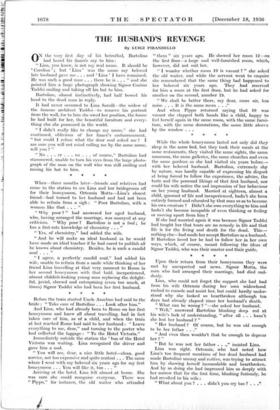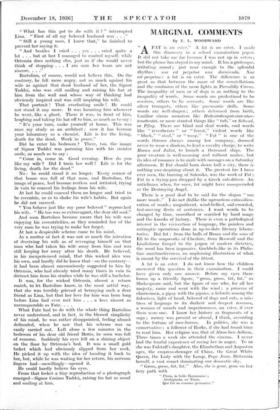THE HUSBAND'S REVENGE
By LUIGI PIRANDELLO
ON the very first day of his betrothal, Bartolino had heard his fiancée say to him : "Lina, you know, is not my real name. It should be ' Carolina ' ; but 'Lina' was the name my beloved late husband gave me . . . and 'Lina' I have remained. He was such a good man . . . there he is . " and she pointed him a large photograph showing Signor Cosimo Taddei smiling and taking off his hat to him.
Bartolino, almost instinctively, had half bowed his head to the dead man in reply.
It had never occurred to Lina Sarulli—the widow of the famous architect Taddei—to remove his portrait from the wall, for to him she owed her position, the house he had built for her, the beautiful furniture and every- thing else she possessed in the world.
"I didn't really like to change my name," she had continued, oblivious of her fiancé's embarrassment, "but could I refuse what the dear soul asked me ? I am sure you will not mind calling me by the same name, will you ? "
"No . . . er . . . no . . . of course," Bartolino had stammered, unable to turn his eyes from the large photo- graph of the man on the wall who. was still smiling and raising his hat to him.
• 'When—three months later—friends and relatives had come to the station to see Lina and her bridegroom off for their honeymoon, Ortensia Motta—Lina's closest friend—had turned to her husband and had not been able to refrain from a sigh : "Poor Bartolino, with a woman like that . . . "
"Why poor ? " had answered her aged husband, who, having arranged the marriage, was annoyed at any criticism. "Why poor ? Bartolino is not a fool ; he has a first-rate knowledge of chemistry . . . "
"Yes, of chemistry," had added the wife.
"And he will make an ideal husband as he would have made an ideal teacher if he had cared to publish all he knows about chemistry. Besides, he is such a candid soul . . . "
"I agree, a perfectly candid soul," had added his wife, unable to refrain from a smile while thinking of her friend Lina travelling at that very moment to Rome in her second honeymoon with that bald, inexperienced, almost childish-looking young man replacing the delight- ful, jovial, shrewd and enterprising (even too much, at times) Signor Taddei who had been her first husband.
Before the train started Uncle Anselmo had said to the bride : "Take care of Bartolino : . . Look after him."
And Lina, who had already been to Rome on her first honeymoon and knew all about travelling, had in fact taken care of him, as of a child, and when the train at last reached Rome had said to her husband : "Leave everything to me, dear," and turning to the porter who had collected the luggage : "To the Hotel Victoria."
Immediately outside the station the 'bus of the Hotel Victoria was waiting. Lina recognised the driver and gave him a nod.
"You will see, dear, a nice little hotel—clean, good service, not too expensive and quite central . . . The same where I went with my beloved six years ago for my first honeymoon . . . You will like it, too .
Arriving at the hotel, Lina felt almost at home. She was sure she could recognise everyone, There was " Pippo," for instance, the old waiter who attended " them " six years ago. He showed her room 12—on the first floor—a large and well-furnished room, which, however, did not suit her.
"I wonder whether room 19 is vacant ? " she asked the old waiter, and while the servant went to enquire she remembered that the same thing had happened to her beloved six years ago. They had reserved for him a room at the first floor, but he had asked for another on the second, number 19. • "We shall be better there, my dear, more air, less noise . . . It is the same room . . ."
And when Pippo returned saying that 19 was vacant she clapped both hands like a child, happy to feel herself again in the same room, with the same furni- ture, with the same decorations, the same little alcove by the window . . .
While the whole honeymoon lasted not only did they sleep in the same bed, but they took their meals at the same restaurants, they visited the same sights, the same museums, the same galleries, the same churches and even the same gardens as she had visited six years before_77- with her beloved husband. Bartolino, extremely shy by nature, was hardly capable of expressing his disgust at being forced to follow the experience, the advice, the taste and the personal likings of that first husband, nor could his wife notice the sad impression of her behaviour on her young husband. Married at eighteen, almost a child, ignorant of life and inexperienced, hadn't she been entirely formed and educated by that man so as to become his own creature ? Didn't she owe everything to him and hadn't she become incapable of even thinking or feeling or moving apart from him ?
If she had married again it was because Signor Taddei had taught her that tears are no remedy in life and that life is for the living and death for the dead. This— nothing else—had made her accept Bartolino as a husband. If Bartolino loved her he had to follow her in her own ways, which, of course, meant following the ideas of Signor Taddei, who was their master and their guide.
Upon their return from their honeymoon they were met by unexpected sad news. Signor Motta, the man who had arranged their marriage, had died sud- denly.
Lina, who could not forget the support she had had from his wife Ortensia during her own widowhood rushed to console and assist her, but could hardly under- stand why she looked so heartbroken although ten days had already elapsed since her husband's death.
"What can be wrong ? "—she asked her husband.
"Well," answered Bartolino blushing deep red at his wife's lack of understanding, "after all . . . hasn't she lost her husband ? "
"Her husband ? Of course, but he was old enough to be her father . . ."
"And even then wouldn't that be enough to depress her ? "
"But he was not her father . . .," insisted Lina.
Lina was right. Ortensia, who had noted how Lina's too frequent mentions of her dead husband had made Bartolino uneasy and restive, was trying to attract him by showing herself inconsolable and heartbroken. And by so doing she had impressed him so deeply with her sorrow that for the first time, blushing furiously, he had revolted to his wife : "What about you ? . . . didn't you cry too ? . . "What has this got to do with it ? " interrupted Lina. "First of all my beloved husband was . . ."
"Still a young man, I know that," he. finished to prevent her saying it.
"And besides I cried . . . yes . . . cried quite a lot . . . but at last I managed to control myself, while Ortensia does nothing else, just as if she would never think of stopping . . . I am sure her tears are not sincere. . . ."
Bartolino, of course, would not believe this. On the contrary, he felt more angry, not so much against his wife as against that dead husband of her, the Signor Taddei, who was still smiling and raising his hat at him from the wall and whose way of thinking had obviously inspired and was still inspiring his wife.
That portrait ! That everlasting smile ! He could not stand it any more. It was haunting him wherever he went, like a ghost. There it was, in front of him, laughing and taking his hat off to him, as much as to say : "It's your turn, make yourself at home. This was once my study as an architect : now it has become your laboratory as a chemist. Life is for the living, death for the dead. Work in peace."
Did he enter his bedroom ? There, too, the image of Signor Taddei was pursuing him with his sinister smile, as much as to say : "come in, come in. Good evening. How do you like my wife ? Did I train her well ? Life is for the living, death for the dead."
• No: he could stand it no longer. Every corner of that house was full of that man, and Bartolino, the image of peace, had become restless and irritated, trying in vain to conceal his feelings from his wife.
At last he could conceal them no longer and tried to be eccentric, so as to shake his wife's habits. But again he did not succeed.
"You behave just like my pOor beloved" reproached his wife. "He too was so extravagant, the dear old soul."
And soon Bartolino became aware that his wife was enjoying his eccentricities, as they reminded her of the 'very man he was trying to make her forget.
At last a despicable scheme came to his mind.
As a matter of fact it was not so much the intention of deceiving his wife as of revenging himself on that man who had taken his Wife away from him and was still keeping her away after his death. He believed, in his inexperienced mind, that this wicked idea was his own, and hardly, did he know that—on the Contrary— it had been almost unconsciously suggested to him by Ortensia, who had already tried many times in vain to distract him from his studies while he was still a bachelor. . It was, for the wicked Ortensia, almost a return match, to let Bartolino know, in the most artful way, that she was terribly grieved at betraying such a dear friend as Lina, but that her love for him was born long before Lina had ever met him . . . a love almost as unconquerable as Fate. . . .
What Fate had to do with the whole thing Bartolino never understood, and in fact, in the blessed simplicity of his mind, he was rather disappointed, feeling almost defrauded, when he saw that his scheme was so easily carried out. Left alone a few minutes in the bedroom of his dear old friend Motta, he soon was full of remorse. Suddenly his eyes fell on a shining object on the floor by Ortensia's bed. It was a small gold locket which had obviously slipped from her neck. He picked it up with the idea of handing it back to her, but, while he was waiting for her return, his nervous fingers had—unwillingly—opened it.
He could hardly believe his eyes.
From that locket a tiny reproduction of a photograph emerged—Signor Cosimo Taddei, raising his hat as usual and smiling at him.











































 Previous page
Previous page